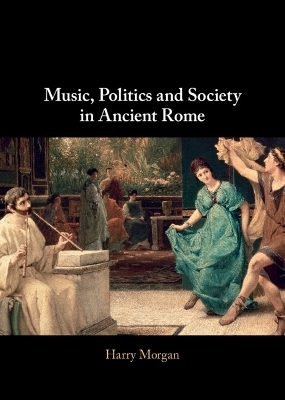
Music, Politics and Society in Ancient Rome
Seiten
2022
Cambridge University Press (Verlag)
978-1-009-23233-3 (ISBN)
Cambridge University Press (Verlag)
978-1-009-23233-3 (ISBN)
Demonstrates that music was fundamental to Roman political culture and social relations, shaping debates about class, gender, ethnicity and more. Draws on a wide range of literary texts, inscriptions and material artefacts from the second century BCE to the end of the reign of Nero in 68 CE.
Music was everywhere in ancient Rome. Wherever one went in the sprawling city, the sound of singing and piping, drumming and strumming was never far out of earshot. This book examines the role of music in Roman politics and society, focusing on the period from the Roman conquest of Greece in the second century BCE to the end of the reign of Nero in 68 CE. Drawing on a wide range of literary texts, inscriptions and material artefacts, Harry Morgan uncovers the tensions between elite and popular attitudes towards music and shows how music was exploited as a tool by political leaders and emperors. Far from being a marginal aspect of daily life, music was fundamental to Roman political culture and social relations, shaping debates about class, gender and ethnicity. The book will be of interest to students and scholars of ancient music and Roman history.
Music was everywhere in ancient Rome. Wherever one went in the sprawling city, the sound of singing and piping, drumming and strumming was never far out of earshot. This book examines the role of music in Roman politics and society, focusing on the period from the Roman conquest of Greece in the second century BCE to the end of the reign of Nero in 68 CE. Drawing on a wide range of literary texts, inscriptions and material artefacts, Harry Morgan uncovers the tensions between elite and popular attitudes towards music and shows how music was exploited as a tool by political leaders and emperors. Far from being a marginal aspect of daily life, music was fundamental to Roman political culture and social relations, shaping debates about class, gender and ethnicity. The book will be of interest to students and scholars of ancient music and Roman history.
Harry Morgan is a Lecturer in Ancient History at Harvard University.
Introduction; 1. The games of L. Anicius Gallus and the cultural politics of music in the second century BCE; 2. Popular music and popular politics in the late republic; 3. Augustus, Apollo's lyre and the harmony of the principate; 4. Nero and the age of musomania.
| Erscheinungsdatum | 28.11.2022 |
|---|---|
| Zusatzinfo | Worked examples or Exercises; 31 Halftones, color |
| Verlagsort | Cambridge |
| Sprache | englisch |
| Maße | 176 x 250 mm |
| Gewicht | 700 g |
| Themenwelt | Kunst / Musik / Theater ► Musik ► Klassik / Oper / Musical |
| Geschichte ► Allgemeine Geschichte ► Vor- und Frühgeschichte | |
| Geschichte ► Allgemeine Geschichte ► Altertum / Antike | |
| Sozialwissenschaften | |
| ISBN-10 | 1-009-23233-9 / 1009232339 |
| ISBN-13 | 978-1-009-23233-3 / 9781009232333 |
| Zustand | Neuware |
| Informationen gemäß Produktsicherheitsverordnung (GPSR) | |
| Haben Sie eine Frage zum Produkt? |
Mehr entdecken
aus dem Bereich
aus dem Bereich
Was Pompeji über uns erzählt
Buch | Hardcover (2023)
Propyläen (Verlag)
32,00 €
auf den Spuren der frühen Zivilisationen
Buch | Hardcover (2023)
C.H.Beck (Verlag)
20,00 €


